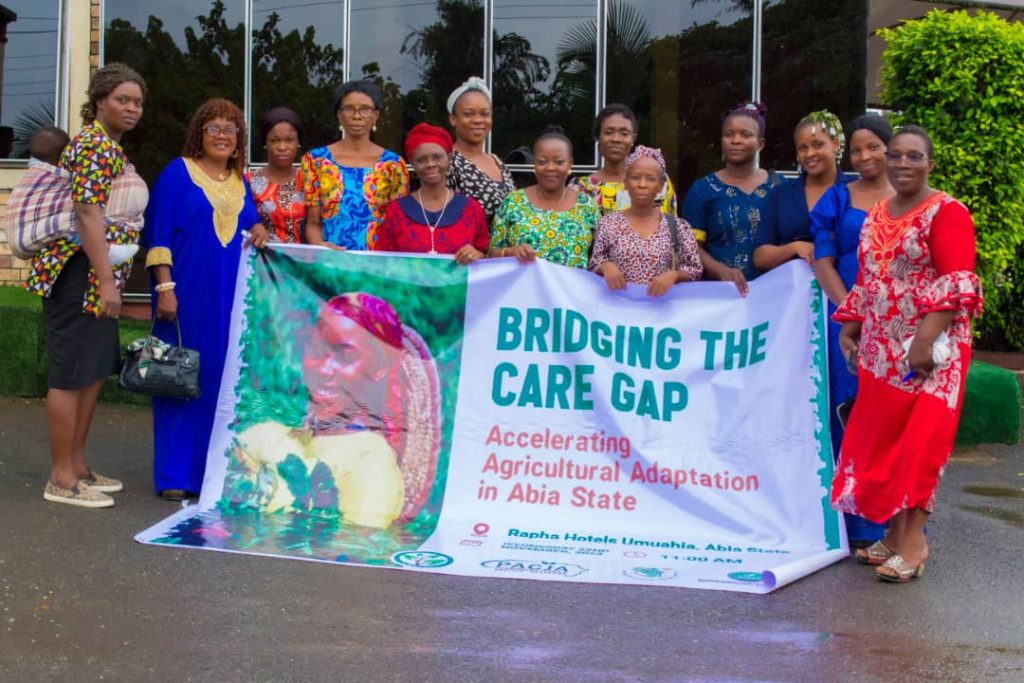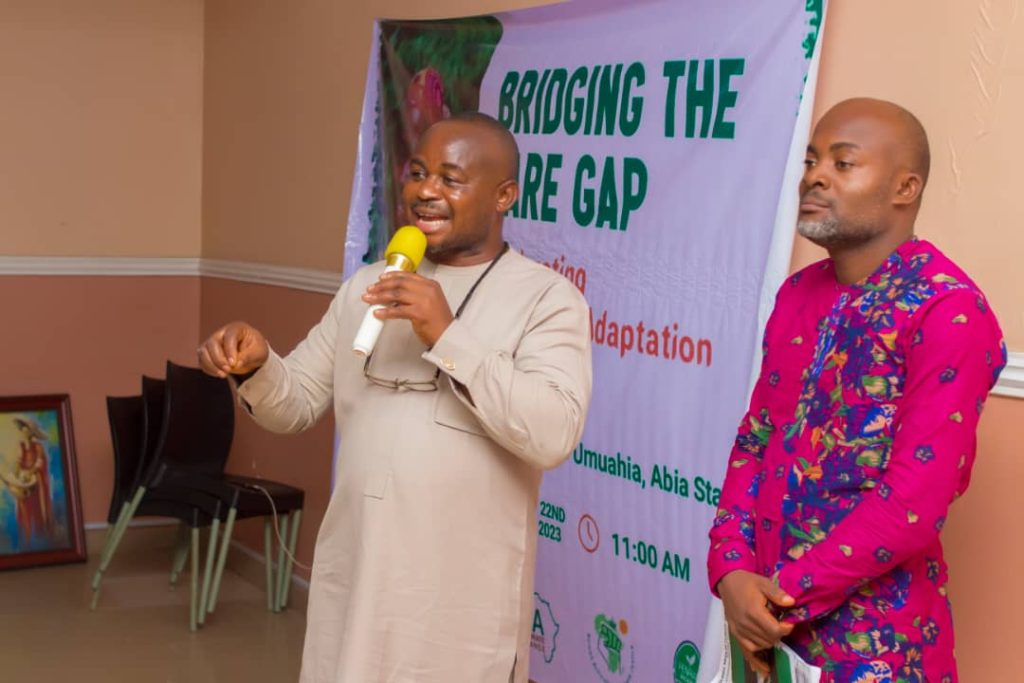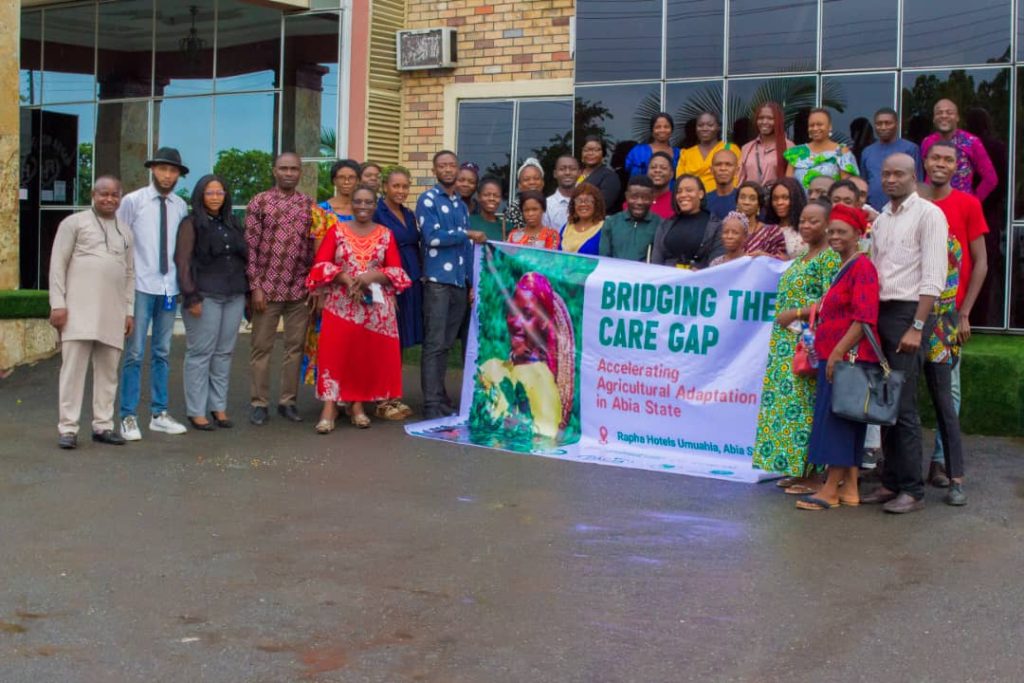
“BRIDGING THE GAP : ACCELERATING AGRICULTURAL ADAPTATION IN ABIA STATE”
Venue : Rapha Hotel Ltd. Umuahia
Date : 22/11/2023
Time: 11 AM
This year event aims at addressing the challenges in agricultural adaptation in Abia state and proffering ways to bridge the existing gaps by identifying key areas of concern with action plans for the implementation.
The event started with welcome remarks and the introduction of participants followed by a brief address by the Executive Director of FENRAD – Comrade Nelson Nwafor who utilised the Global Week of Climate Action 2023 in addressing threats and climate-related disasters towards attainment of accelerating Agricultural adaptation processes to climate change impacts, while stating that adaptation is crucial to build the resilience of the local communities in the South East zone as well as the whole country.

This year (2023) event focused on the themes of climate, peace, gender equality inclusion and sustainable food systems. There’s therefore a pressing need for collective action and widespread awareness by involving individuals, communities, govermments, and organizations to climate challenges through various activities, discussion’s and commitments.
Next address was from Mr Agu Chukwuemeka who represented the National Network Coordinator of Climate and sustainable development (CsDevNet) Mr Abu Stephen who welcomed the stakeholders, students and community members with great joy. He stated that agricultural adoption in Abia state,and Nigeria is a pressing topic and thanked FENRAD for the workshop. He further posited that the workshop will help to present Nigeria voices and drive the message for many of the sectoral interventions that required to be done to help Nigeria, Africa and the world at large to cope with climate change challenges.
In his goodwill message, Abia State Oil Producing Area development Commission (ASOPADEC) representative, thanked Comradely Nelson Nwafor for bringing up such awareness as various stakeholders come together to discuss, is a very commendable one and stated his organisation will ensure there’s a clean environment and a zero pollution of aquatic life. He noted that a lot need to be done., while buttressing that issues of this nature is what the organization is after as it comes to limelight.
A representative of Michael Okpara University students, thanked the organizers for bringing various stakeholders together in order to achieve the aim of the Global Week of Climate Change Action 2023 through accelerating adaptation in Abia state.
In his keynote address, Mr Chris Ibe who represented the Commissioner for Environment, thanked the organizers for such a loudable program which we ought to implement. He stated that the world is in need of initiatives that will promote climate action in agriculture to the grassroot and concluded that we should tap into the insurance provided by the African Development Bank (ADB).
Questions and discussion were not left out at the end.
A paper presentation on accelerating agricultural and climate change adaptation in Abia state : The NEWMAP approach by Abia NEWMAP representative – Mr Prince Onyenweaku who explained what NEWMAP is all about, further stating that NEWMAO is about erosion intervention and tend to incorporate community NGOs in order to bring about solution that would make the world a better place. Some of NEWMAP key results achieved in Abia state communities were not left out. Other areas he addresed includes –
The use of bik – engineering technique in plants adventitious roots that bind the soil together. An example is the Vertiva Grass.
Soil and water conservation such as no tillage or contour plowing in order to reduce rill and sheet erosion.
Capacity building of community farmers and community interest groups (CIG) to maintain farm incomes and reduce externalities associated with erosive agricultural techniques
Abia state climate change NEWMAP summit approaches include –
- Climate smart agriculture with 3 pillars of –
(A) Producing food with improved nutrition and increased productivity
(B) Enhance resilience by reducing vulnerability to soil erosion, drought, pests and diseases
(C) Reduce emissions, avoid deforestation and ways to absorb carbon.
At the end, opportunity was given for questions and discussion. - Wealth creation
- Afforestation/Reforestation drive
- Adoption of modern agricultural practices
- Collaboration with MDAs and private sectors
- Adaptation to technology using bamboo project, clean cook stove, solar dryer, biogas, etc.
2nd paper presentation on – Bridging the gap ; Accelerating agricultural adaptation ; The role of civil society organization and environmental advocate by the Executive Director of FENRAD – Comrade Nelson Nwafor who stated the objective of the Global Week of Climate Change Action stakeholders engagement was to mobilize and engage a diverse array of stakeholders on a global scale to address the urgent challenges of climate change.
The initiative aims at inspiring collective action towards a sustainable and resilient future through collaboration, sharing innovative solutions and raising awareness. He stated that addressing threats and climate related disasters is crucial for accelerating agricultural adaptation to climate change impacts.

To achieve effective adaptation, a comprehensive approach that combines policy measures, technolical innovations snd community engagement is vital.
Some of these approaches / strategies to accelerate agricultural adaptation include –
- Risk assessment and early warning systems
- To identify vulnerable areas and crops
- To provide farmers with timely information on climate related threats
- Climate smart agricultural practices –
- Promotion of climate smart agricultural practices that enhance resilience and sustainability
- Introduction of drought resistant and heat tolerant crop varieties
- Encouragement of agroforestry and conservation agriculture to improve soil health and water retention.
- Water management –
- Investing in efficient irrigation systems and water storage facilities
- Promotion of rainwater harvesting and watershed management to ensure water availability during dry periods.
- Capacity building and education by providing training and education programs to farmers on climate resilient farming techniques and by equipping farmers with skills to interpret and utilize climate information for decision making.
- Financial support by establishing financial mechanisms, including insurance and credit facilities to protect farmers from climate related losses.
- Policy framework
- By developing and implementing climate – smart agricultural policies at National and regional levels.
- Ensuring alignment with international agreements and frameworks addressing climate change and sustainable development.
- Research and innovation by –
- in research to develop and disseminate new technologies and practices
- Supporting the development of climate resilient crop varieties through breeding programs.
- Community engagement and social resilience by –
- Involving local communities in decision making processes related to climate adaptation.
- Building social networks and Community Based Organizations (CSOs).to enhance resilience
- Encouraging the development of diversified livelihoods to reduce dependece on agriculture alone.
- International collaboration by –
- Collaborating with International organizations, research institutions, and neighboring countries to share knowledge and resources.
- Participating in global initiatives aimed at addressing climate change impacts on agriculture.
Expected outcomes on the presentation include – Increaeed awareness and understanding of climate issues across diverse global audiences
- Strengthened global partnerships and collaborations for climate action.
- Concrete commitments and actions from stakeholders toward sustainable practices.
By involving a broad spectrum of stakeholders, the event inspired transformative actions and fostered collective commitment to building a sustainable and resilient future for generations to come.
Questions and discussion followed after the presentation.
Stakeholders Engagement –
A syndicate group discussion by having two groups made up of farmers, government agencies, NGOs, and private sectors in addressing agriculturist challenges were grouped into –
- Addressing food system and food sufficient to accelerate agricultural growth in the emerging climate change challenge.
- Bridging the care gap; Addressing threats and climate related disasters towards attainment of accelerating agricultural adaptation processes to climate change impacts.
The group presentation and discussion were as follows –
GROUP 1 – Agricultural challeges and solutions –
- Youth and gender inclusion
- Increase in agricultural technologies that can attract youths
- Soilless technology
- Adoption of green house farming systems
- Adoption of zealous students, pay and encourage them in agricultural pursuit
- Communication channels –
- By making knowledge very understandable through the use of native language, pictures, videos, etc.
- Utilization of young extension farmers.
- Financial empowerment –
- Inability to manage finance when released.
Solution – - By creating agricultural trainings , provision of funds/grants for the youths to start agricultural business especially the serious minded ones.
- Tax rebate – By reducing importation and begin production here in Abia state.
- Budget – Through proper channelling of funds released for agriculture in the state.
- Education support – By adopting zealous students, pay and encourage them In agricultural pursuit
8.Utilization of waste products from poultry as fertilizers. - Involvement of tertiary institution’s in agricultural challenges.
- Institutionalization of a body that can coordinate funds or grants in the right channel to avoid misappropriation of fund
- Implementation of set goals
GROUP 2 – Agricultural challenges and solutions
(A) Challenges –
- Erosion / Flooding
- Loss of soil
- Acid rain pollution
- Pest attacks
- Deforestation/ disruption of the ecosystem
- Rise in sea level due to climate change/oil spillage
- Rise in temperature due to climate change affect livestock and plant/seedling production.
- Release of methane gas lead to rise in temperature
(B) Solution –
1.By getting early warning systems from NIMET to guide farmers
- By using extension workers to give farmers weather forecast
- Integration of irrigation/drainage practices into our farming systems
- Natural manure utilization should be encouraged.
- Research institutions should make available hybrid climate resilient seedlings available to farmers.
- Use of biological means of controlling pests than using pesticides and herbicides.
- Encouragement of renewable energy sources like solar powered dryers and kilns in our agricultural processing while discouraging machines using fossil fuels.
- Encouragement of agroforestry and afforestation – planting of trees, shrubs, fruit crops
- Regulations on use of old/used cans that pollutes the environment
- Adoption of geomapping to guide farm farmers in choice of crops to be planted in different ecozones.
- Adoption of rotational farming / shifting cultivation.
- Use of better agricultural technology to reduce methane gas emission. In conclusion , the foregoing were the key findings and recommendations by the discussions, emphasizing the need in bridging the gap in agricultural adaptation for the development of agriculture in Abia state and the country at large.
This report provides a roadmap for accelerating agricultural adaptation in Abia state, aimed at creating a more resilient and sustainable future for the agricultural sector.
Signed:
Ugochukwu Emmanuel
(Program officer, ICT/Media and communications, FENRAD)
On behalf of:
Comrade Nelson Nwafor
(Executive Director, FENRAD)
Kudos to the organizers: #FENRAD #CsDevNet